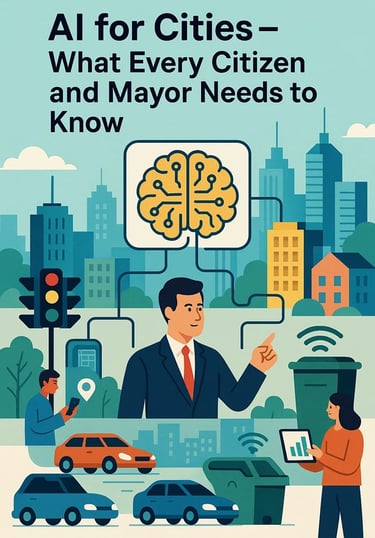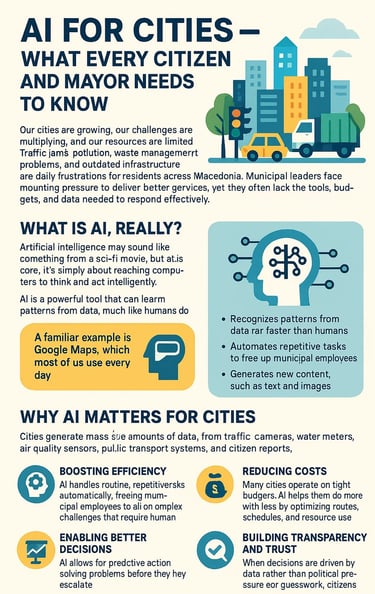AI for Cities – What Every Citizen and Mayor Needs to Know
As the local elections this October draw near, the way our cities are managed is up for debate. Decisions made now will shape how we live and work for years to come. This is where Artificial Intelligence (AI) comes in, not as a buzzword or distant future technology, but as a practical tool already improving cities around the world today.
By: Toni Popovski / 12.10.2025


Humane AI Advocacy
Our cities are growing, our challenges are multiplying, and our resources are limited. Traffic jams, pollution, waste management problems, and outdated infrastructure are daily frustrations for residents across North Macedonia. Municipal leaders face mounting pressure to deliver better services, yet they often lack the tools, budgets, and data needed to respond effectively.
As the local elections this October draw near, the way our cities are managed is up for debate. Decisions made now will shape how we live and work for years to come. This is where Artificial Intelligence (AI) comes in, not as a buzzword or distant future technology, but as a practical tool already improving cities around the world today.
Imagine traffic lights that adjust automatically to reduce congestion, waste collection systems that optimize routes in real time, or water utilities that predict leaks before they happen. These are not science-fiction ideas, they are real solutions currently in use in cities like Pittsburgh in the USA, London in the UK, and Hangzhou in China.
The question is no longer “Will AI transform our cities?”
but rather, “How can we use it wisely to improve life for everyone?”
This blog series will explore that question, starting with a simple introduction to what AI is, why it matters, and how it can help build better cities in North Macedonia.
What Is AI, Really?
Artificial Intelligence may sound like something from a sci-fi movie, but at its core, it’s simply about teaching computers to think and act intelligently. AI is a powerful tool that can learn patterns from data, much like humans do.
For example, by analysing thousands of data points on traffic flow or water usage, AI can recognize trends and make sense of them far faster than any team of people. Once these patterns are understood, AI can predict what’s likely to happen next, like anticipating a water pipe leak before it bursts or knowing where a traffic accident is most likely to occur, so preventive measures can be taken in advance.
AI also automates repetitive tasks that currently take up valuable time for municipal employees. Whether it’s processing building permit applications or answering citizens’ frequently asked questions, AI can handle these tasks quickly and consistently, freeing staff to focus on more complex problems. Beyond this, AI can even generate new content, from text and images to 3D city models that help planners visualise changes before they are built.
A familiar example is Google Maps, which most of us use every day. It collects real-time data from millions of phones and sensors, analyses it, and predicts the fastest route to your destination. As conditions change, a traffic jam forms or a road closes, it updates automatically, guiding you smoothly on your way.
Now, imagine applying that same kind of intelligence to an entire city:
Traffic lights that “talk” to each other to keep cars moving.
Waste trucks that only visit bins that are full, saving fuel and time.
Emergency services that respond faster by instantly analyzing the location and severity of incidents.
The key takeaway: AI isn’t about robots or distant futuristic gadgets. It’s about making the systems we already depend on smarter, faster, and more efficient, creating cities that work better for everyone.
Why AI Matters for Cities
Every day, cities generate massive amounts of data. It comes from everywhere, traffic cameras, water meters, air quality sensors, public transport systems, and citizen reports.
The problem is that much of this data goes unused because there’s simply too much for humans to process in real time. As a result, valuable insights are lost, and opportunities to improve services are missed.
AI changes this completely by analysing huge volumes of information quickly and accurately. It turns raw data into actionable insights, helping city leaders make smarter, evidence-based decisions. This brings four major benefits:
1. Boosting Efficiency
AI handles routine, repetitive tasks automatically, freeing municipal employees to focus on complex challenges that require human judgment.
For example, an AI-powered chatbot can instantly answer common citizen questions, such as garbage collection schedules, allowing staff to spend time on urgent or specialised issues.
In London, AI technology is helping detect water leaks before they become major problems. Systems like FIDO Tech’s platform monitor underground acoustic signals, allowing utilities such as Thames Water to find and fix leaks early. This approach has reduced water loss by 15%, saving over $90 million annually and improving service delivery.
2. Reducing Costs
Many cities operate on tight budgets. AI helps them do more with less by optimising routes, schedules, and resource use.
In Johannesburg, South Africa, AI is used to plan garbage truck routes dynamically. Instead of fixed, predetermined paths, trucks adjust based on which bins are actually full. This saves fuel, cuts emissions, and speeds up waste collection.
3. Enabling Better Decisions
Traditionally, local governments react to problems after they happen, a traffic jam, a burst pipe, or a missed waste pickup.
AI allows for predictive action, solving problems before they escalate. In Pittsburgh, USA, an AI-driven traffic light system called Surtrac continuously monitors vehicle flows and adjusts signals in real time. The result: travel times reduced by 25%, vehicle idling cut by 40%, and smoother traffic overall. In Hangzhou, China, the government’s City Brain initiative integrates data from cameras, emergency services, and public transit. This has increased average traffic speeds by 15% and significantly improved emergency response times, ensuring ambulances and fire trucks reach people faster.
4. Building Transparency and Trust
AI isn’t just about speed and savings, it’s about accountability.
When decisions are driven by data rather than political pressure or guesswork, citizens can see how public money is being spent. For example:
Waste collection routes can be tracked in real time to ensure fairness.
Infrastructure repair schedules can be published and justified with evidence.
Traffic reports can demonstrate real reductions in congestion or pollution.
By making government actions visible and verifiable, AI builds public trust and reduces the risk of corruption.
These global examples show that AI is not a luxury, it’s a practical tool for creating cities that work better for everyone. By adopting similar strategies, municipalities in North Macedonia can leapfrog into a smarter future, delivering services that are proactive, cost-effective, and citizen-focused.
Opportunities for North Macedonia
North Macedonia faces many of the same challenges as other countries: rapid urbanisation, limited resources, and growing demands for better services. But it also has a unique opportunity to leap ahead by embracing AI strategically.
Many municipalities today rely on outdated systems that don’t connect with each other. Budgets are tight, staff are stretched thin, and citizens are asking for more, cleaner streets, smoother traffic, and more transparency.
Starting with small, practical AI projects can deliver quick, visible results.
Smart traffic lights could reduce congestion and cut travel times.
Public transport apps could provide real-time arrival information.
Smart waste bins could signal when they’re full, allowing trucks to collect only what’s needed and save money.
AI can also enhance safety, with faster emergency response and smart video monitoring in public spaces. Environmental sensors can track air and water quality, while digital twins, virtual models of entire cities, can help planners test new ideas before construction begins.
Imagine Skopje with smooth-flowing traffic, cleaner air, and reliable services, all coordinated through intelligent, data-driven systems. This isn’t a distant dream, with clear priorities and strong leadership, it can begin today.
Addressing Concerns and Risks
While AI offers great opportunities, it also raises valid concerns that must be addressed openly to build public trust.
One common fear is that AI will replace human workers. While certain jobs may evolve, AI also creates new roles, such as data analysts, technicians, and system managers. It allows employees to focus on higher-value work rather than repetitive tasks.
Privacy is another key concern. Because AI relies on data, there’s a natural worry about surveillance and misuse. Strong data protection laws and anonymisation practices are essential. Citizens should always understand how their data is collected and used, and have a say in the process.
Cost is also important. Advanced technology doesn’t have to mean higher taxes. Cities can start small, using pilot projects to prove value before scaling up. Public-private partnerships can also help fund major initiatives.
Seattle, USA, provides a model for managing these challenges. The city created clear rules for AI use, trained employees on ethical practices, and actively involved the community in decision-making. This transparent approach built the trust needed for successful implementation.
By addressing these concerns proactively, cities can ensure that AI serves the public good and benefits everyone.
Call to Action: Shaping the Future of Our Cities
AI is no longer a distant possibility — it’s here, and it’s already transforming cities worldwide. The question for North Macedonia is simple: Will we lead, or will we lag behind?
Citizens can:
Stay informed about how AI affects their communities.
Ask candidates about their plans for smart city development.
Take part in public discussions and decision-making.
Municipal leaders can:
Start small with practical, affordable AI pilots.
Partner with universities, NGOs, and tech companies.
Ensure transparency and ethics guide every step.
This October, as we vote in local elections, let’s remember that technology is about people, not machines. By using AI wisely, we can build cities that are cleaner, safer, and more efficient — while giving citizens a stronger voice in shaping their future.
AI is not about replacing humans. It’s about making cities work better for everyone.
Glossary
AI (Artificial Intelligence): Computer systems that can perform tasks requiring human-like intelligence.
Digital Twin: A virtual model of a physical system, like a city or utility network.
Predictive Analytics: Using data to forecast future events or problems.
Machine Learning: A type of AI that improves its performance as it processes more data.


